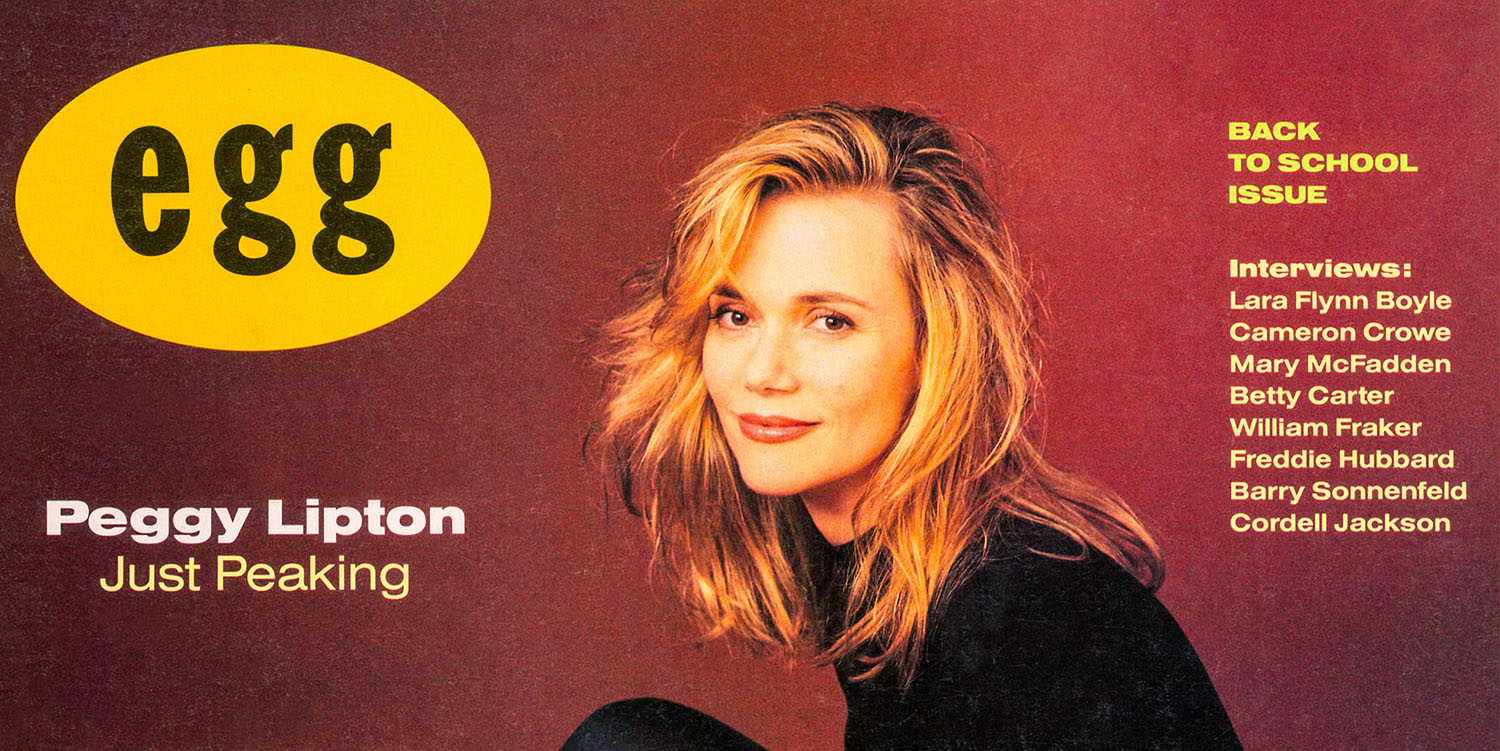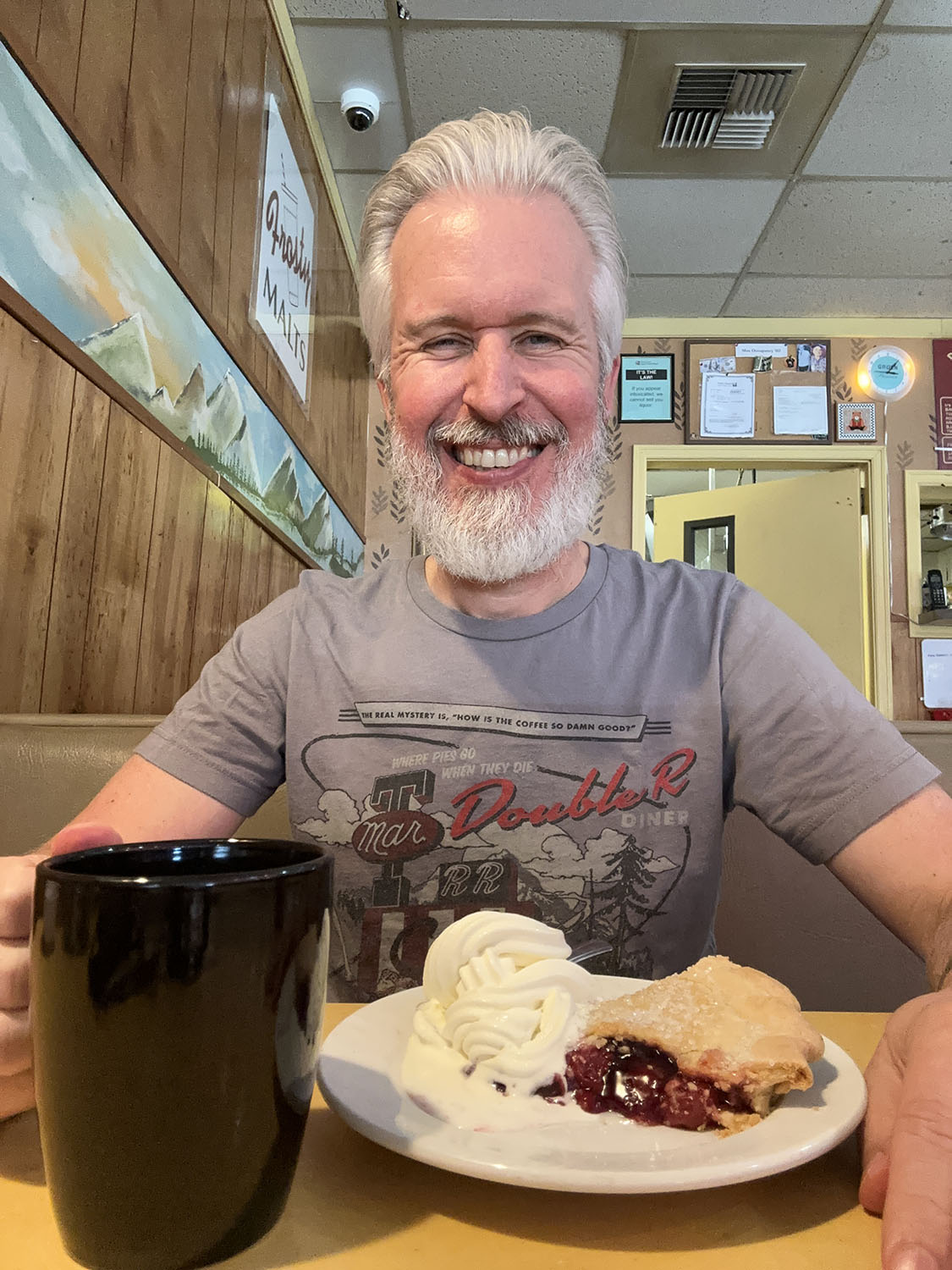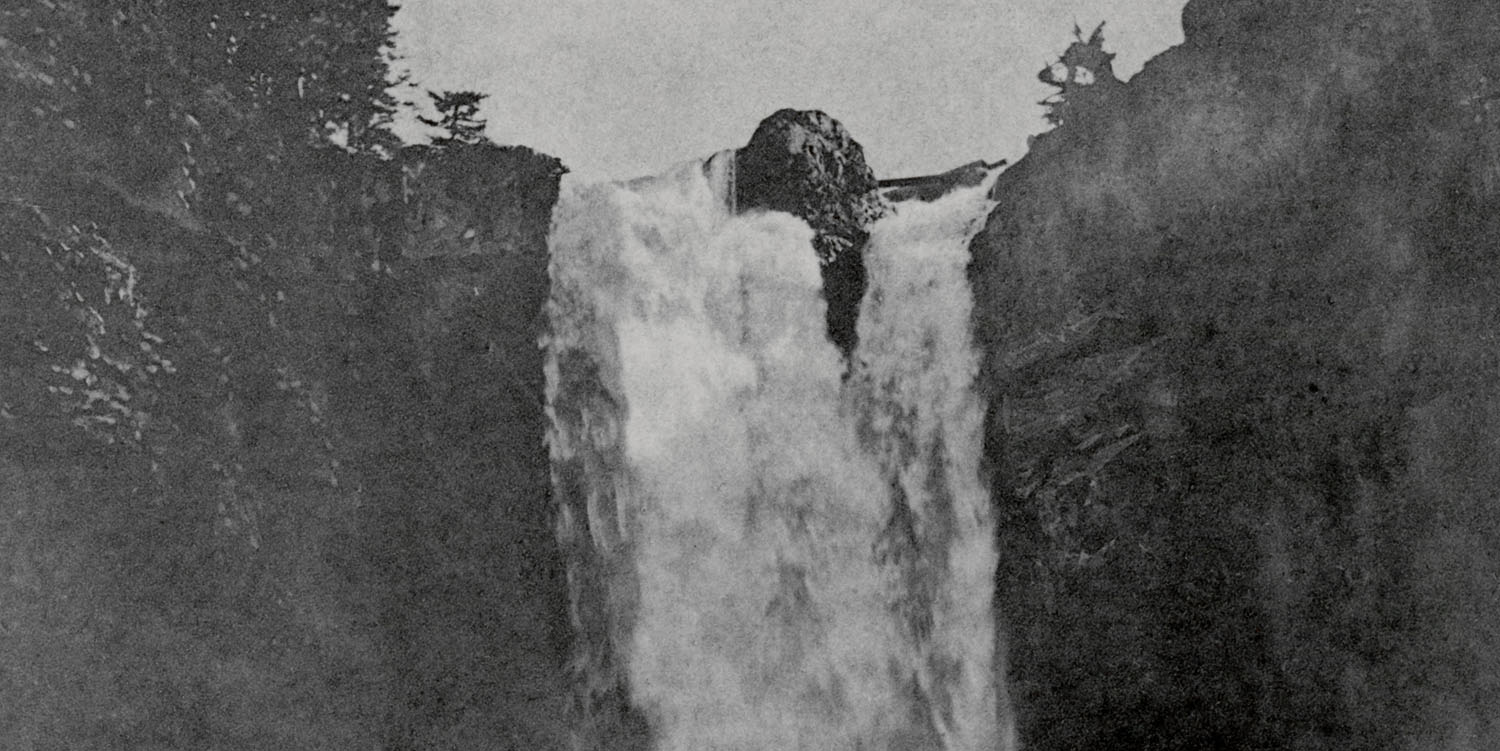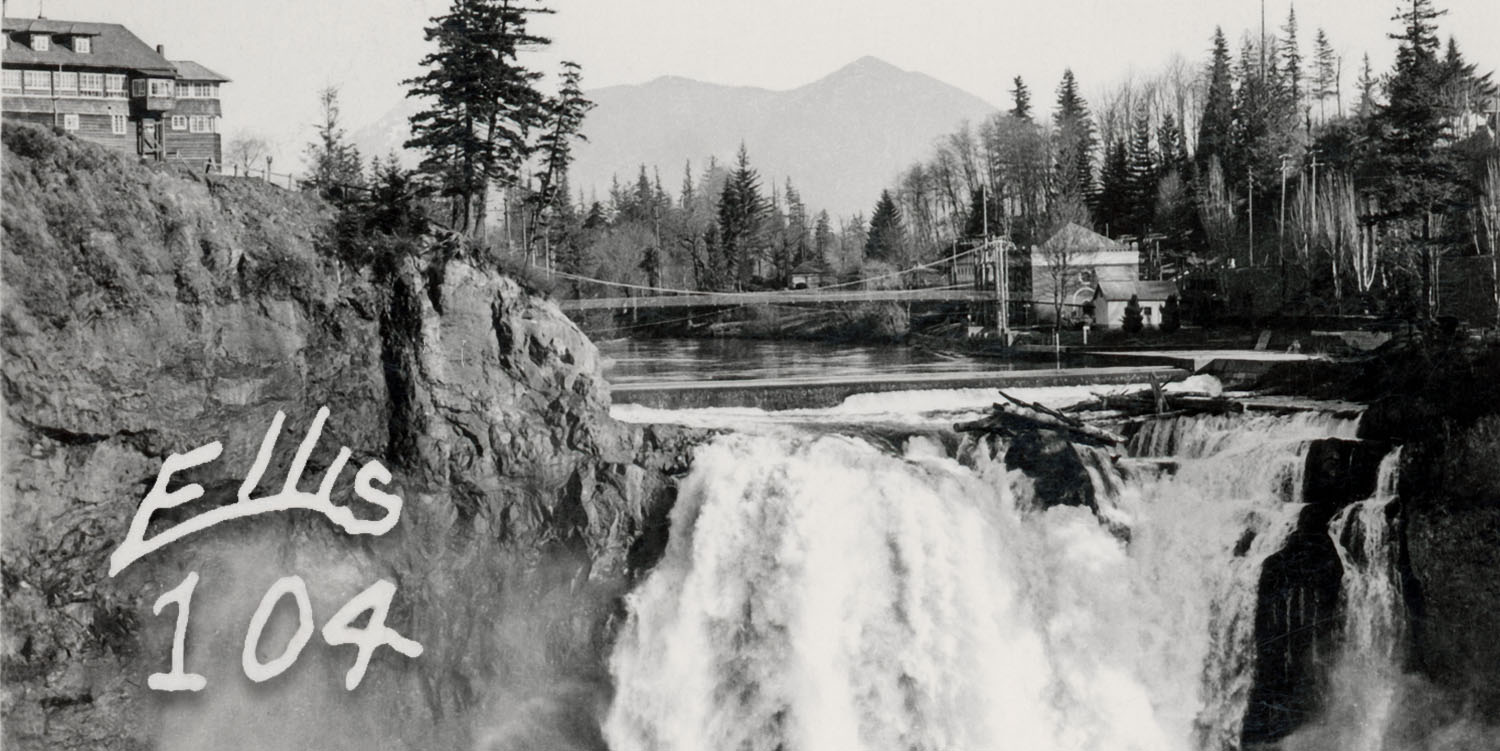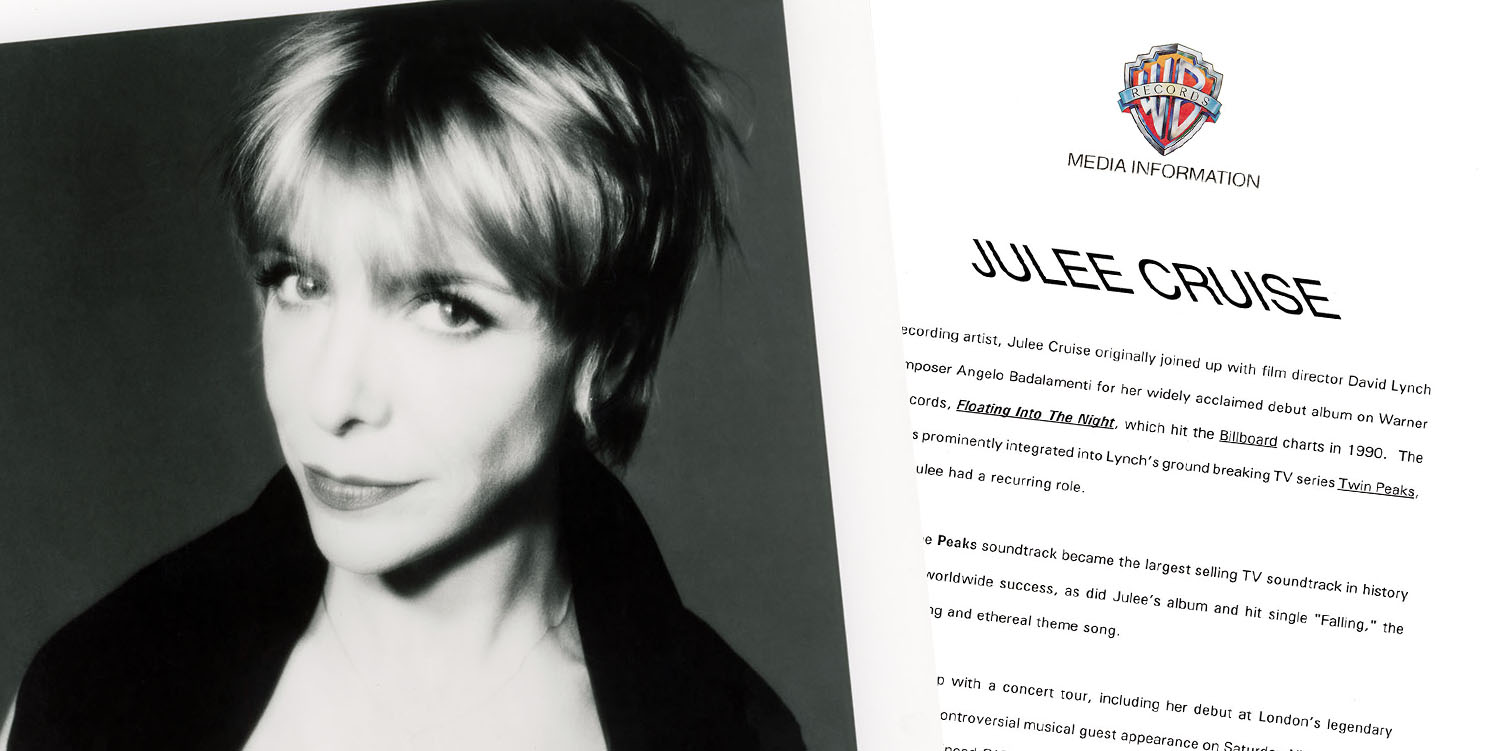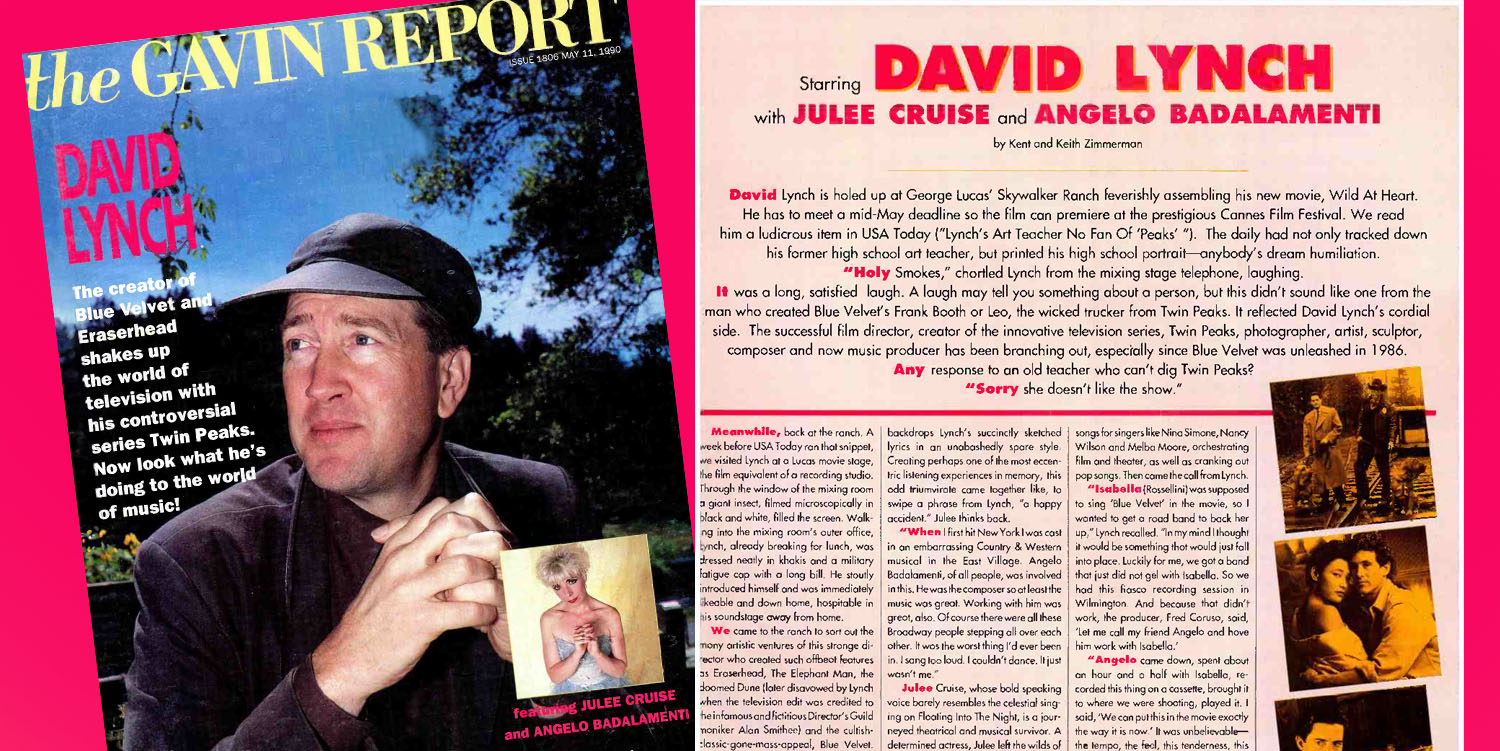As a Twin Peaks archivist, I love finding interviews from actors and crew when David Lynch and Mark Frost’s show first aired on the ABC Television Network in 1990. These interviews were captured at a time when memories of working on the show were fresh. As the years pass, memories fade or stories are embellished but these first-year interviews are the closest to the truth. That’s why I was delighted to find interviews with actors Peggy Lipton and Lara Flynn Boyle in the October 1990 issue of the short-lived Forbes, Inc. magazine, Egg. They both discuss working with Lynch and offer interesting insights about their experience.
EGG MAGAZINE, OCTOBER 1990 – COVER
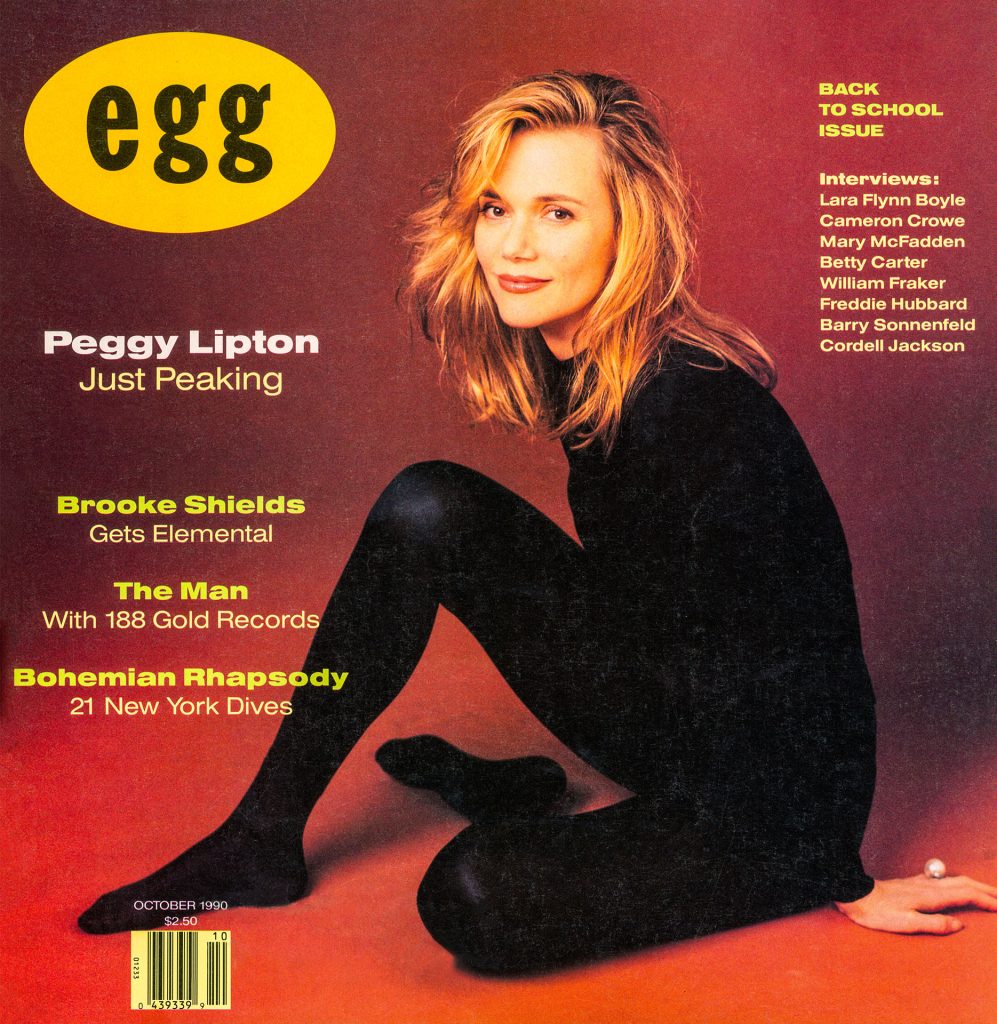
The late Malcom Forbes (who coincidentally passed on February 24, 1990) launched Egg Magazine in March 1990 after “his failed attempt to buy Interview in 1989 left him and his son Timothy (Egg‘s day-to-day publisher) with a bag of downtown ideas and no place to use them.” The oversized magazine, which “covered the downtown scene,” was aimed at a young, urban, hip audiences in New York and Los Angeles. It was a strange gamble to publish a magazine at at time when magazine advertising and newsstand sales began a long, slow decline.
By March 1991, the magazine published its final issue. Timothy C. Forbes said in a New York Times article from January 5, 1991 that Egg was “a victim of the overall environment, and it was just not possible to see how the growth that we had to have was going to happen.”
On September 30, 1990, the much-anticipated second season of Twin Peaks aired on ABC. Peggy Lipton, who played Norma Jennings, appeared on the cover of Egg‘s October 1990 issue, which was released in September that year. Dressed in all black and wearing an large pearl ring, the issue teased an interview with her titled “Peggy Lipton, Just Peaking.”
Other interviews for their “Back to School” issue included Lara Flynn Boyle, Cameron Crowe, Freddie Hubbard, Barry Sonnefeld, Cordell Jackson and more.
The cover image was taken by Deborah Feingold. Lipton’s hair was styled by Philippe Becker for Pierre Michel/Plaza. Kimberly Briggs provided makeup. Styling for Peggy was by Wendy Schecter. Her black rayon bodysuit was released by Azzedine with black hosiery by DKNY and shoes by Stephane Kelian.
EGG MAGAZINE, OCTOBER 1990 – PAGE 3 | TABLE OF CONTENTS
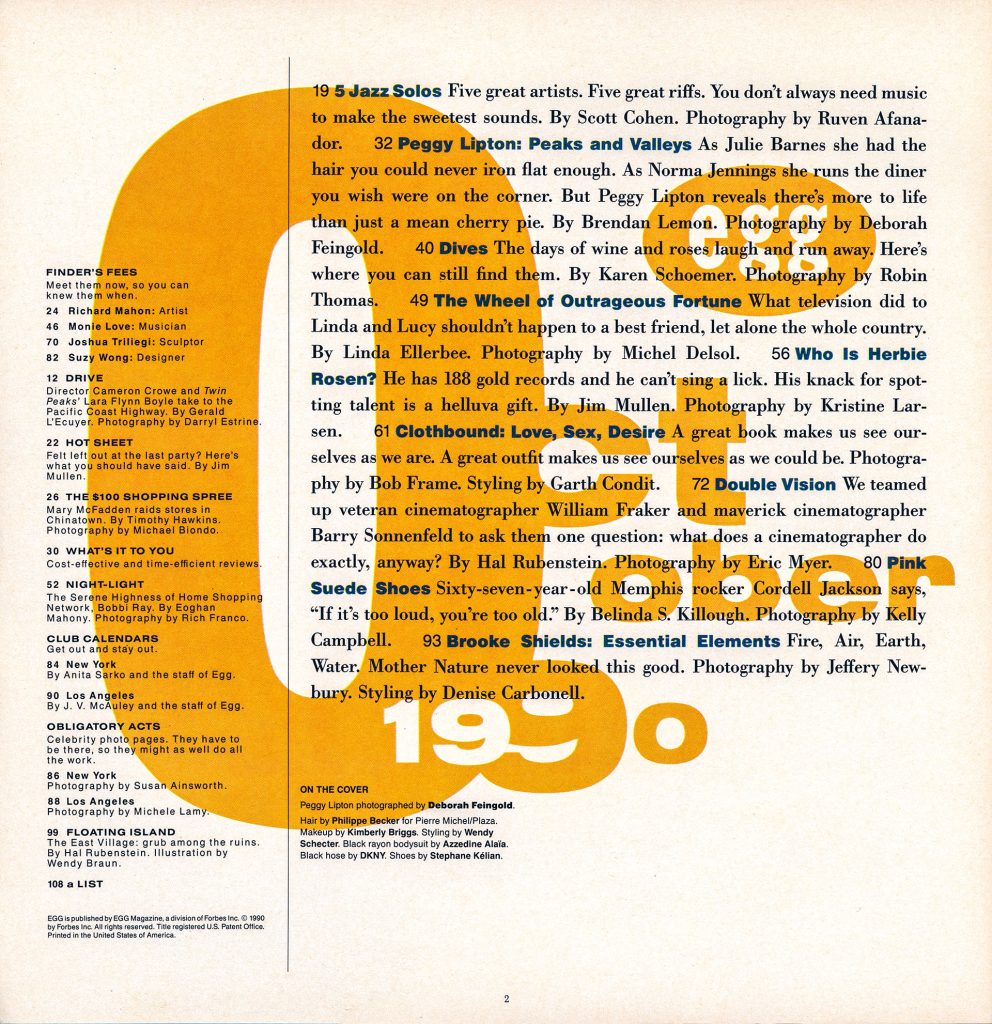
The third page of Egg contained a Table of Contents which mentions Boyle’s interview on page 12 and Lipton’s interview on page 32:
“12 Drive Director Cameron Crowe and Twin Peaks’ Lara Flynn Boyle take to the Pacific Coast Highway. By Gerald L’Ecuyer. Photography by Darryl Estrine.”
“32 Peggy Lipton: Peaks and Valleys. As julie Barnes she had the hair you could never iron flat enough. As Norma Jennings she runs the diner you wish were on the corner. But Peggy Lipton reveals there’s more to life than just a mean cherry pie.”
EGG MAGAZINE, OCTOBER 1990 – PAGES 12-17 | “DRIVE”
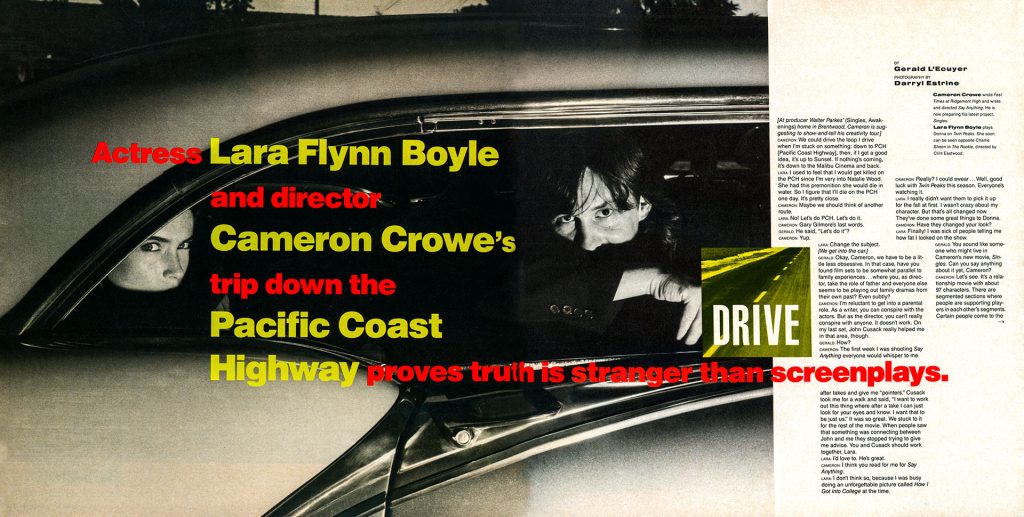
The interview with Lara Flynn Boyle and Cameron Crowe begins on Pages 12-13. Boyle is seen peaking out from the backseat of a car. The photo caption reads:
“Cameron Crowe wrote Fast Times at Ridgemont High and wrote and directed Say Anything. He is now preparing his latest project, Singles. Lara Flynn Boyle plays Donna on Twin Peaks. She soon can be seen opposite Charlie Sheen in The Rookie, directed by Clint Eastwood.”
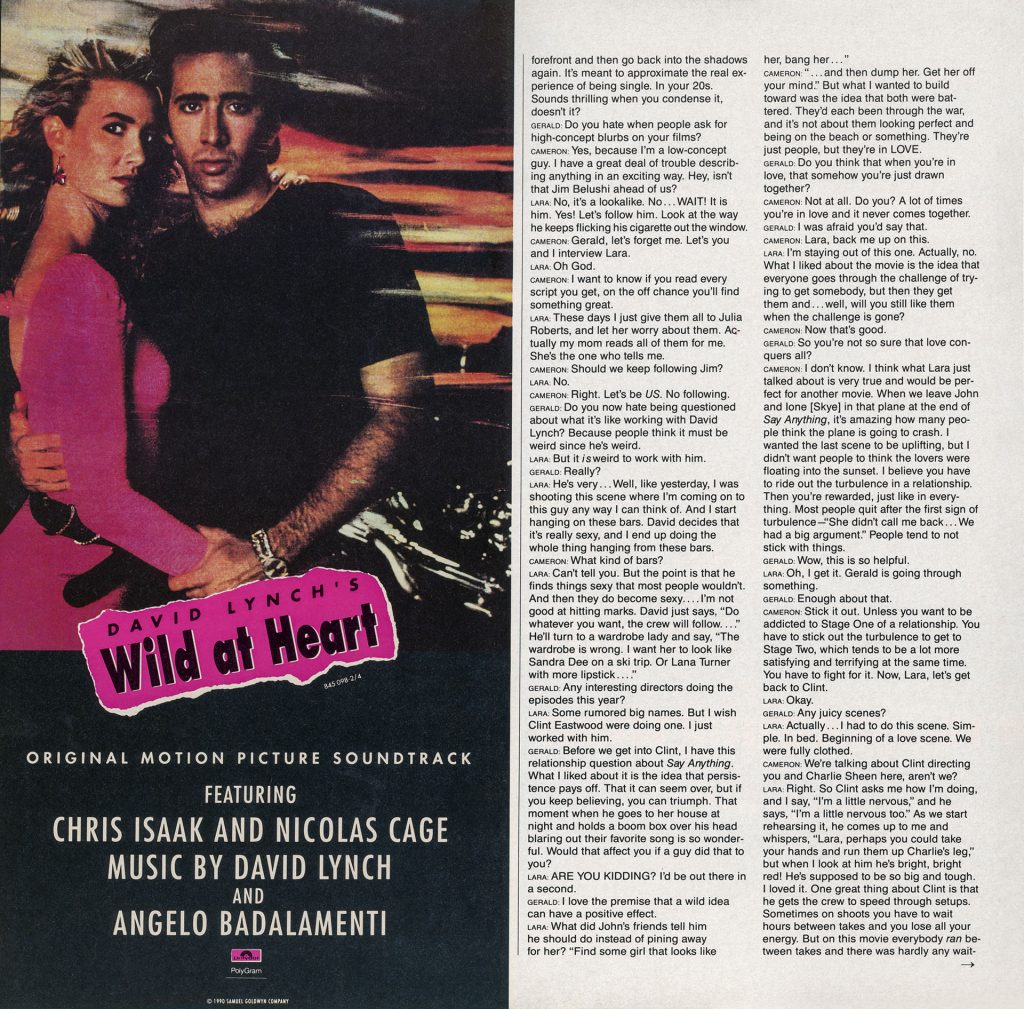
The “Drive” article continues on page 14 opposite a full-page advertisement for the Original Motion Picture Soundtrack to David Lynch’s Wild At Heart (that was my gateway into Lynch’s mind which eventually lead me to Twin Peaks). Lara discussed working with David Lynch for what was the Twin Peaks Sheriff’s Department jail cell scene with James Marshall in episode 2.001.
GERALD [L’ECUYER, REPORTER]: Do you now hate being questioned about what it’s like working with David Lynch? Because people think it must be weird since he’s weird.
LARA.: But it is weird to work with him.
GERALD: Really?
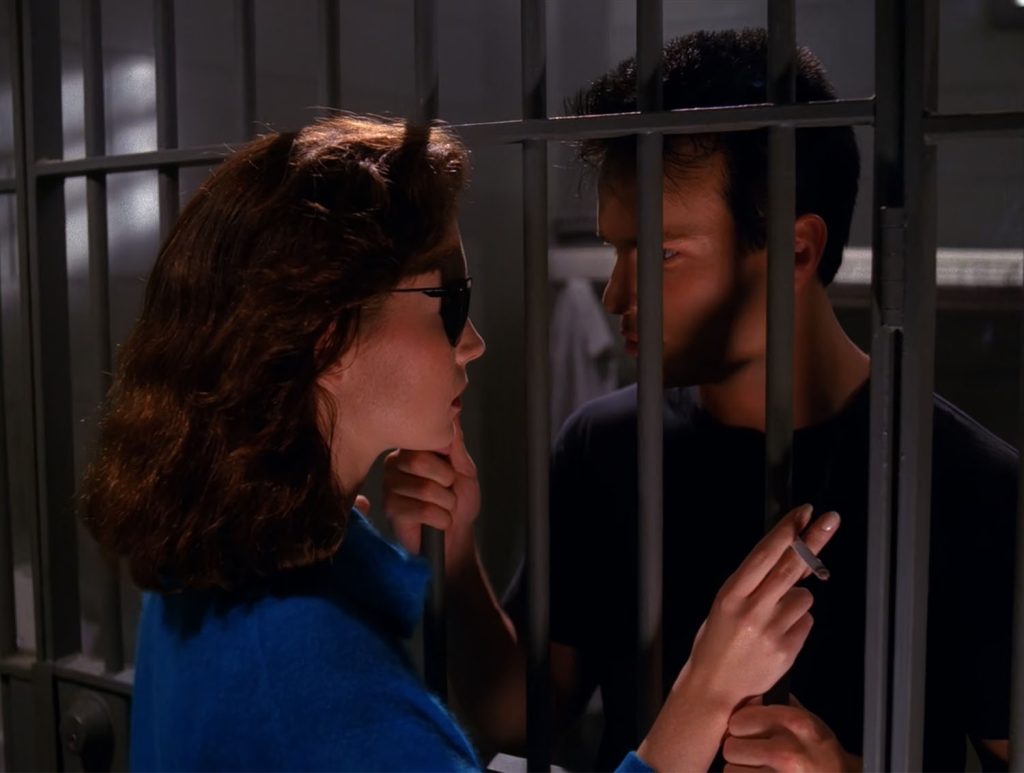
LARA: He’s very… Well, like yesterday, I was shooting this scene where I’m coming on to this guy any way I can think of. And I start hanging on these bars. David decides that it’s really sexy, and I end up doing the whole thing hanging from these bars.
CAMERON [CROWE]: What kind of bars?
LARA: Can’t tell you. But the point is that he finds things sexy that most people wouldn’t. And then they do become sexy…. I’m not good at hitting marks. David just says, ‘Do whatever you want, the crew will follow….’ He’ll turn to a wardrobe lady and say, ‘The wardrobe is wrong. I want her to look like Sandra Dee on a ski trip. Or Lana Turner with more lipstick….’
GERALD: Any interesting directors doing the episodes this year?
LARA: Some rumored big names. But I wish Clint Eastwood were doing one. I just worked with him.
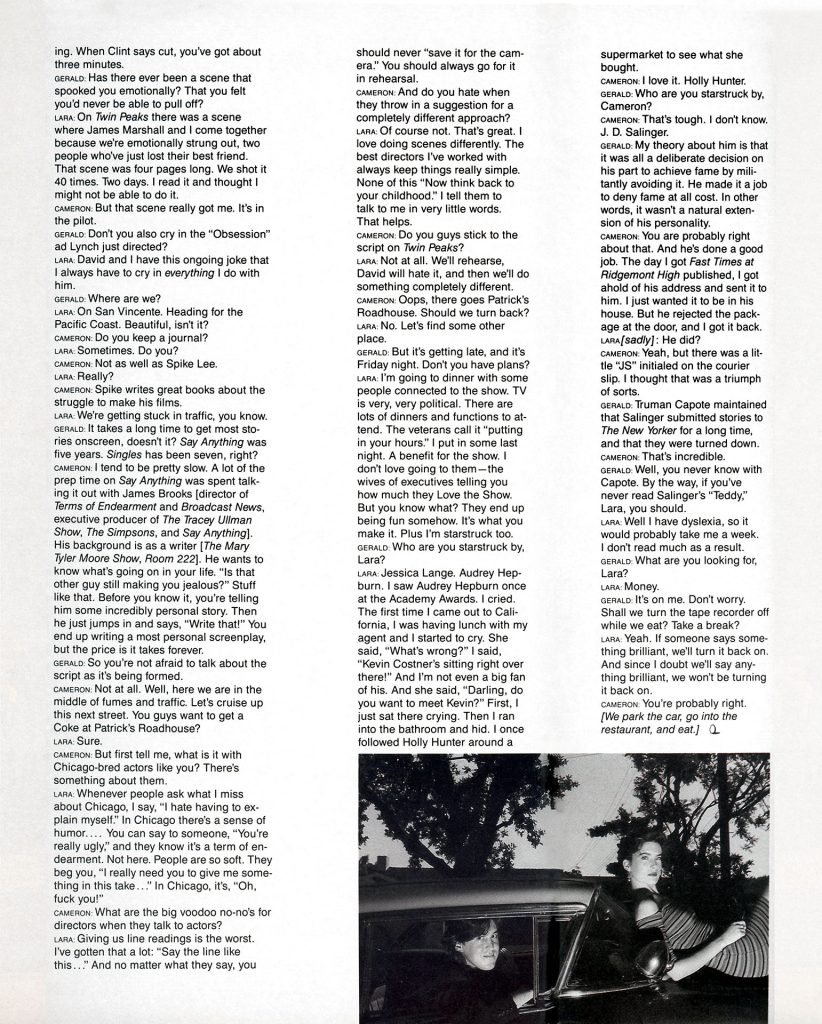
Boyle and Crowe’s interview concludes on pages 16-17 but not before more Twin Peaks tidbits are shared.
GERALD: Has there ever been a scene that spooked you emotionally? That you felt you’d never be able to pull off?
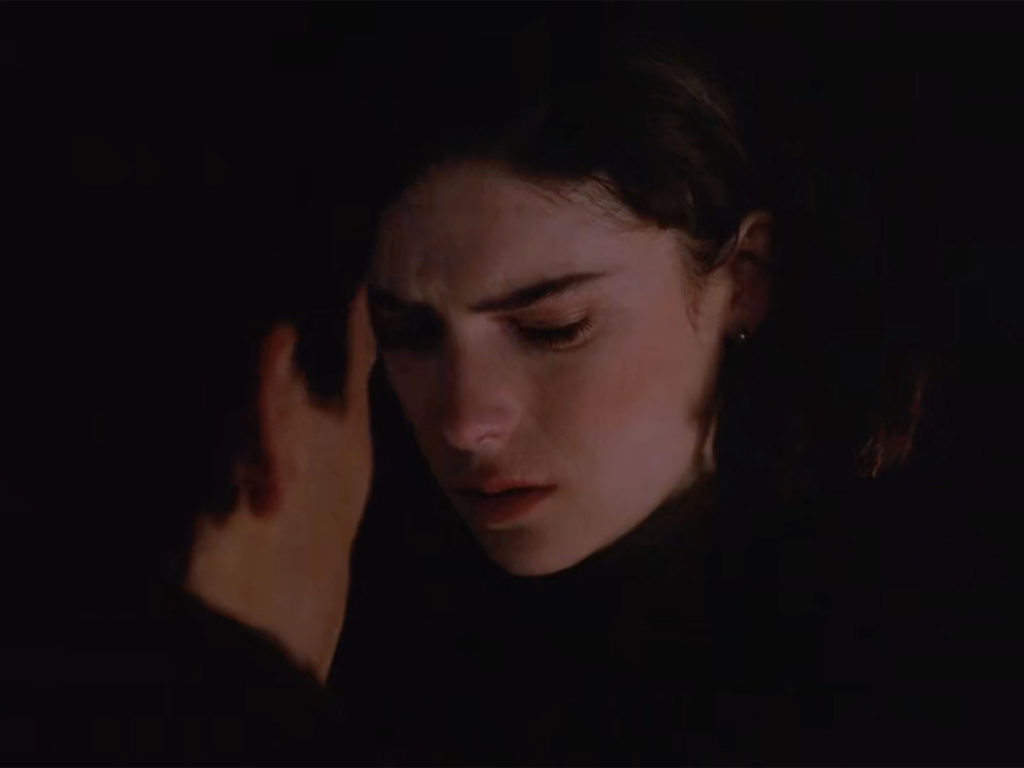
LARA: On Twin Peaks there was a scene where James Marshall and I come together because we’re emotionally strung out, two people who’ve just lost their best friend. That scene was four pages long. We shot it 40 times. Two days. I read it and thought I might not be able to do it.
CAMERON: But that scene really got me. It’s in the pilot.
GERALD: Don’t you also cry in the “Obsession” ad Lynch just directed?
LARA: David and I have this ongoing joke that I always have to cry in everything I do with him.
After a beat, Cameron Crowe asks Boyle about sticking to the script in Twin Peaks.
CAMERON: Do you guys stick to the script on Twin Peaks?
LARA: Not at all. We’ll rehearse, David will hate it, and then we’ll do something completely different.
Boyle shares her Friday night plans to which she mentions doing a benefit for Twin Peaks on a Thursday night. It’s difficult to say which fundraiser she attended. It will require more cross-referencing of production materials and newspaper clippings.
GERALD: But it’s getting late, and it’s Friday night. Don’t you have plans?
LARA: I’m going to dinner with some people connected to the show. TV is very, very political. There are lots of dinners and functions to attend. The veterans call it ‘putting in your hours.’ I put in some last night. A benefit for the show. I don’t love going to them—the wives of executives telling you how much they Love the Show. But you know what? They end up being fun somehow. It’s what you make it. Plus I’m starstruck too.
EGG MAGAZINE, OCTOBER 1990 – PAGES 32-35 | “PEGGY LIPTON: PEAKS & VALLEYS”
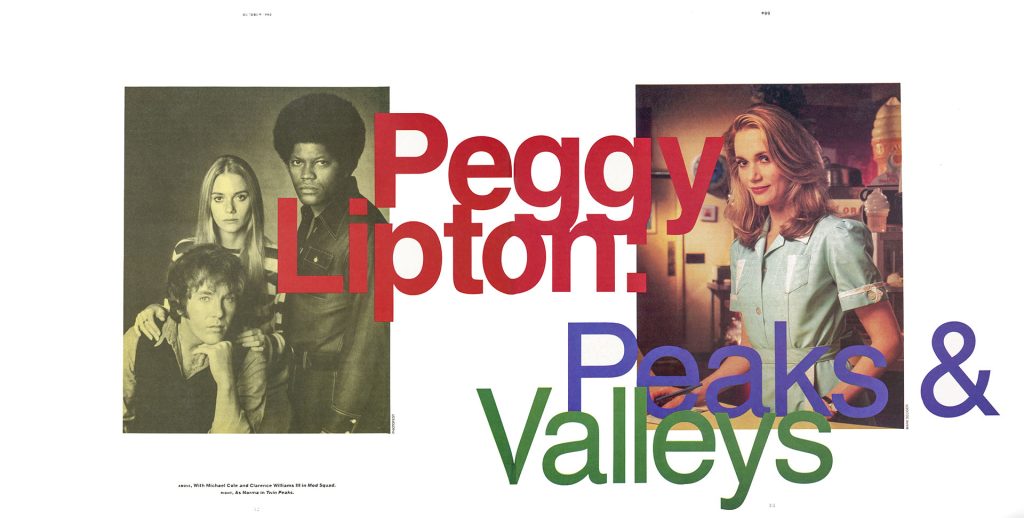
Brandon Lemon’s article titled “Peggy Lipton: Peaks & Valleys” begins on pages 32-33 with two images – Lipton with Mod Squad co-stars Clarence Williams III and Michael Cole and Lipton standing on the Double R Diner set as Norma Jennings in Twin Peaks. The latter image was taken by Mark Seliger.
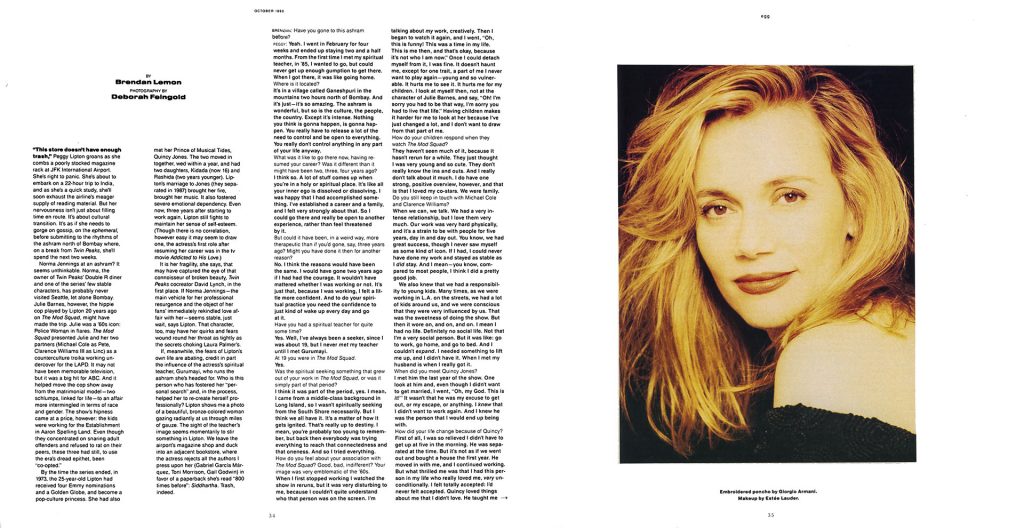
The first page of Lipton’s interview discusses her career history, appearing for five seasons on ABC’s Mod Squad to eventually being cast as Norma Jennings on Twin Peaks. While at JFK International Airport, Lemon asks Peggy about her then upcoming trip to an ashram in India followed by questions about her relationship with Quincy Jones and two children.

Deborah Feingold’s stunning image of Lipton appears on page 33. She is wearing an embroidered poncho by Giorgio Armani with makeup by Estée Lauder.
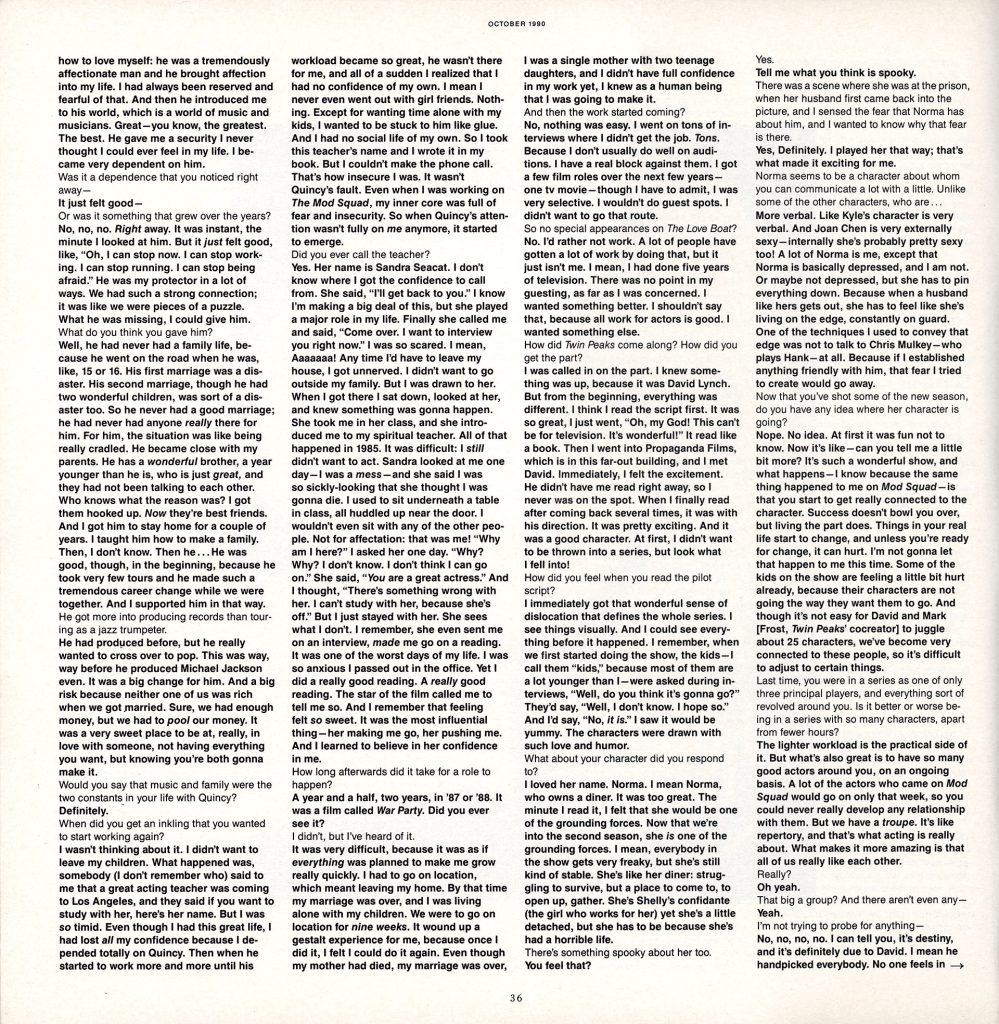
On page 36, Lipton opens up to questions about her experience with Twin Peaks.
LEMON: How did Twin Peaks come along? How did you get the part?
LIPTON: I was called in on the part. I knew something was up, because it was David Lynch. But from the beginning, everything was different. I think I read the script first. It was so great, I just went, “Oh, my God! This can’t be for television. It’s wonderful!” It read like a book. Then I went into Propaganda Films, which is in this far-out building, and I met David. Immediately, I felt the excitement. He didn’t have me read right away, so I never was on the spot. When I finally read after coming back several times, it was with his direction. It was pretty exciting. And it was a good character. At first, I didn’t want to be thrown into a series, but look what I fell into!
LEMON: How did you feel when you read the pilot script?
LIPTON: I immediately got that wonderful sense of dislocation that defines the whole series. I see things visually. And I could see every-thing before it happened. I remember, when we first started doing the show, the kids – call them “kids,” because most of them are a lot younger than I—were asked during interviews, “Well, do you think it’s gonna go?” They’d say, “Well, I don’t know. I hope so.” And I’d say, “No, it is.” I saw it would be yummy. The characters were drawn with such love and humor.
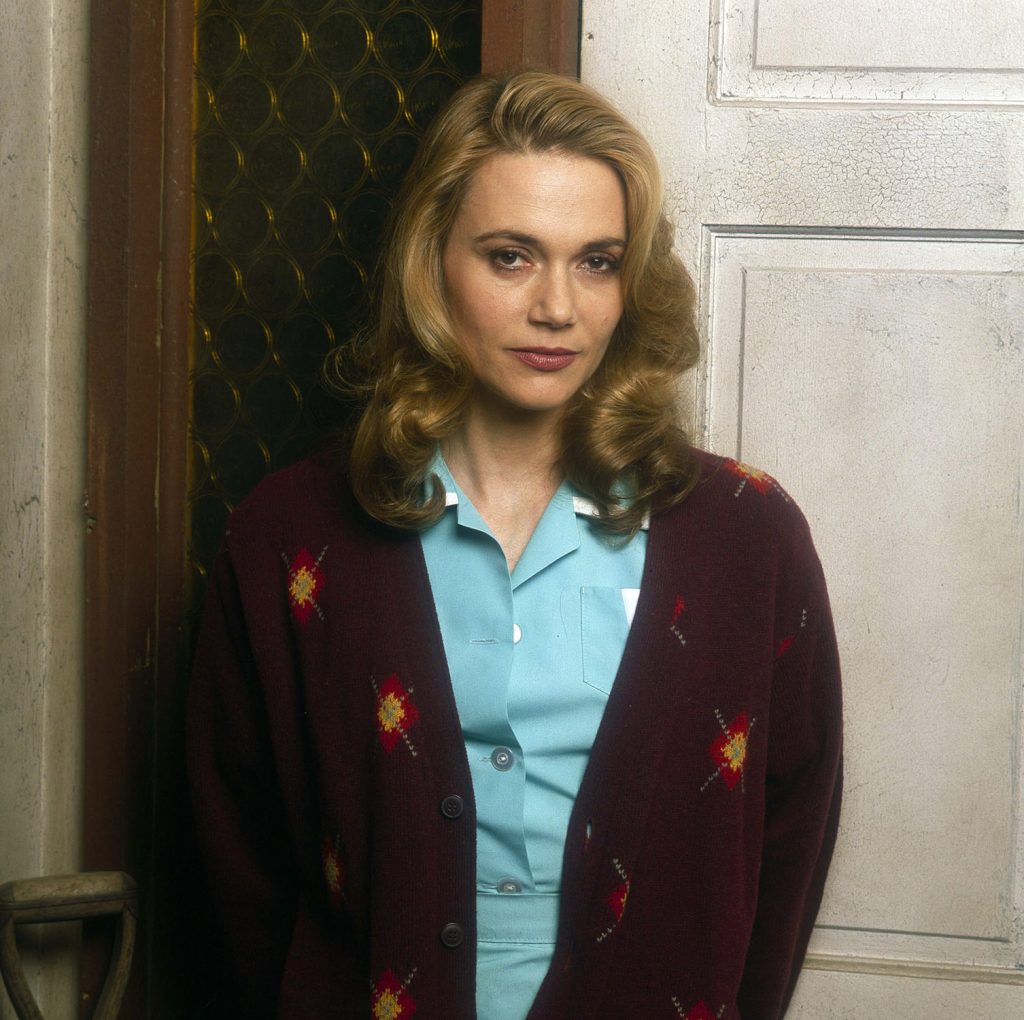
LEMON: What about your character did you respond to?
LIPTON: I loved her name. Norma. I mean Norma, who owns a diner. It was too great. The minute I read it, I felt that she would be one of the grounding forces. Now that we’re into the second season, she is one of the grounding forces. I mean, everybody in the show gets very freaky, but she’s still kind of stable. She’s like her diner: struggling to survive, but a place to come to, to open up, gather. She’s Shelly’s confidante (the girl who works for her) yet she’s a little detached, but she has to be because she’s had a horrible life.
LEMON: There’s something spooky about her too.
LIPTON: You feel that?
LEMON: Yes.
LIPTON: Tell me what you think is spooky.
LEMON: There was a scene where she was at the prison, when her husband first came back into the picture, and I sensed the fear that Norma has about him, and I wanted to know why that fear is there.
LIPTON: Yes, Definitely. I played her that way; that’s what made it exciting for me.
LEMON: Norma seems to be a character about whom you can communicate a lot with a little. Unlike some of the other characters, who are…
LIPTON: More verbal. Like Kyle’s character is very verbal. And Joan Chen is very externally sexy—internally she’s probably pretty sexy too! A lot of Norma is me, except that Norma is basically depressed, and I am not. Or maybe not depressed, but she has to pin everything down. Because when a husband like hers gets out, she has to feel like she’s living on the edge, constantly on guard. One of the techniques I used to convey that edge was not to talk to Chris Mulkey—who plays Hank—at all. Because if I established anything friendly with him, that fear I tried to create would go away.
LEMON: Now that you’ve shot some of the new season, do you have any idea where her character is going?
LIPTON: Nope. No idea. At first it was fun not to know. Now it’s like—can you tell me a little bit more? It’s such a wonderful show, and what happens-1 know because the same thing happened to me on Mod Squad—is that you start to get really connected to the character. Success doesn’t bowl you over, but living the part does. Things in your real life start to change, and unless you’re ready for change, it can hurt. I’m not gonna let that happen to me this time. Some of the kids on the show are feeling a little bit hurt already, because their characters are not going the way they want them to go. And though it’s not easy for David and Mark [Frost, Twin Peaks’ cocreator] to juggle about 25 characters, we’ve become very connected to these people, so it’s difficult to adjust to certain things.
LEMON: Last time, you were in a series as one of only three principal players, and everything sort of revolved around you. Is it better or worse be-ing in a series with so many characters, apart from fewer hours?
LIPTON: The lighter workload is the practical side of it. But what’s also great is to have so many good actors around you, on an ongoing basis. A lot of the actors who came on Mod Squad would go on only that week, so you could never really develop any relationship with them. But we have a troupe. It’s like repertory, and that’s what acting is really about. What makes it more amazing is that all of us really like each other.
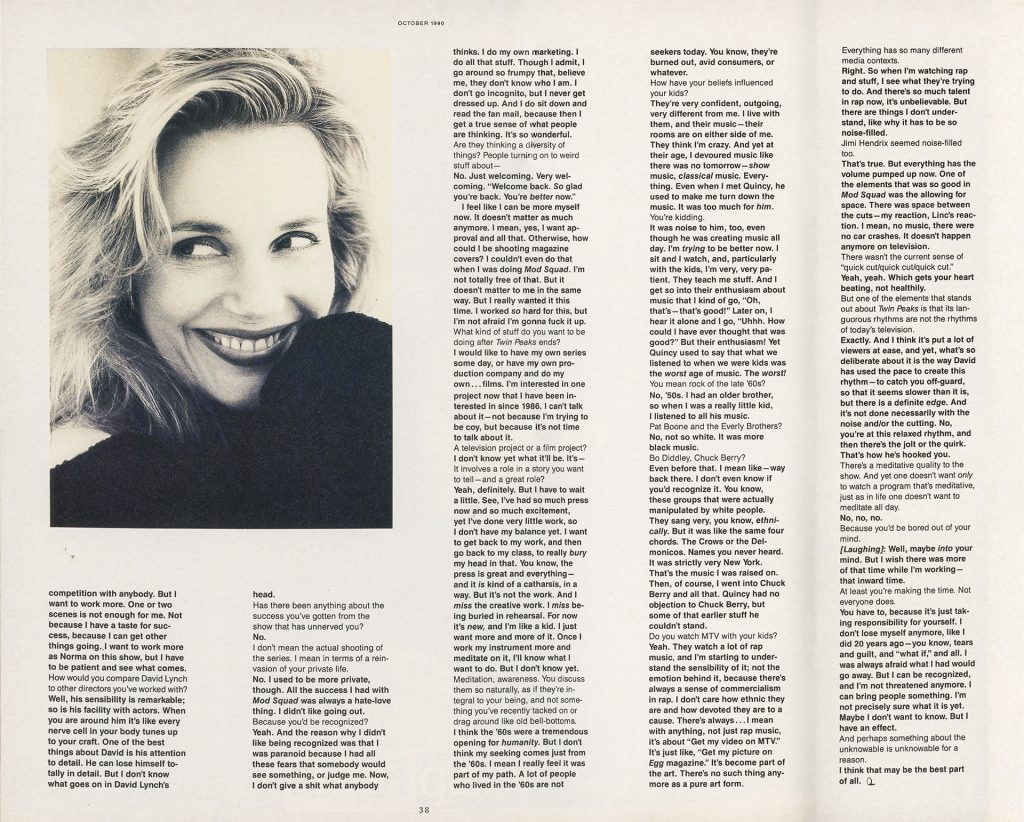
LEMON: Really?
LIPTON: Oh yeah. That big a group? And there aren’t even any—Yeah. I’m not trying to probe for anything—No, no, no, no. I can tell you, it’s destiny, and it’s definitely due to David. I mean he handpicked everybody. No one feels in competition with anybody. But I want to work more. One or two scenes is not enough for me. Not because I have a taste for success, because I can get other things going..I want to work more as Norma on this show, but I have to be patient and see what comes.
LEMON: How would you compare David Lynch to other directors you’ve worked with?
LIPTON: Well, his sensibility is remarkable; so is his facility with actors. When you are around him it’s like every nerve cell in your body tunes up to your craft. One of the best things about David is his attention to detail. He can lose himself to-tally in detail. But I don’t know what goes on in David Lynch’s head.
LEMON: Has there been anything about the success you’ve gotten from the show that has unnerved you?
LIPTON:No.
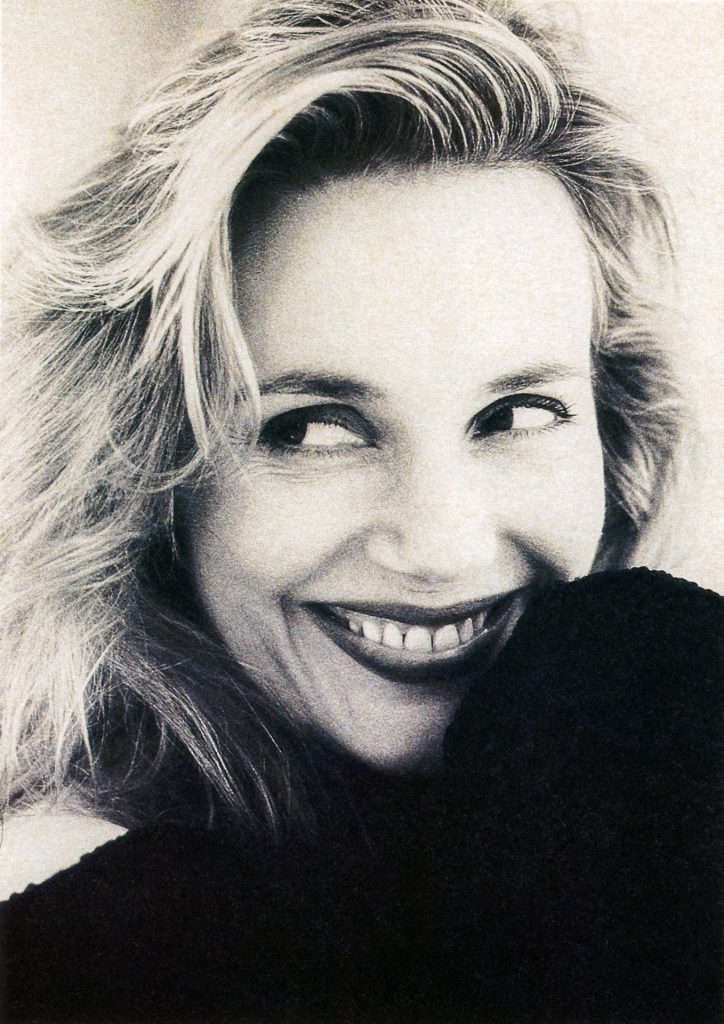
LEMON: I don’t mean the actual shooting of the series. I mean in terms of a re-invasion of your private life.
LIPTON: No. I used to be more private, though. All the success I had with Mod Squad was always a hate-love thing. I didn’t like going out.
LEMON: Because you’d be recognized?
LIPTON: Yeah. And the mason why I didn’t like being recognized was that I was paranoid because I had all these fears that somebody would see something, or judge me. Now, I don’t give a shit what anybody thinks. I do my own marketing. I do all that stuff. Though I admit, I go around so frumpy that, believe me, they don’t know who I am. don’t go incognito, but I never get dressed up. And I do sit down and read the fan mail, because then I get a true sense of what people are thinking. It’s so wonderful.
LEMON: Are they thinking a diversity of things? People turning on to weird stuff about—
LIPTON: No. Just welcoming. Very welcoming. “Welcome back. So glad you’re back. You’re better now, I feel like I can be more myself now. It doesn’t matter as much anymore. I mean, yes, I want approval and all that. Otherwise, how could I be shooting magazine covers? I couldn’t even do that when I was doing Mod Squad. I’m not totally free of that. But it doesn’t matter to me in the same way. But I really wanted it this time. I worked so hard for this, but I’m not afraid I’m gonna fuck it up.
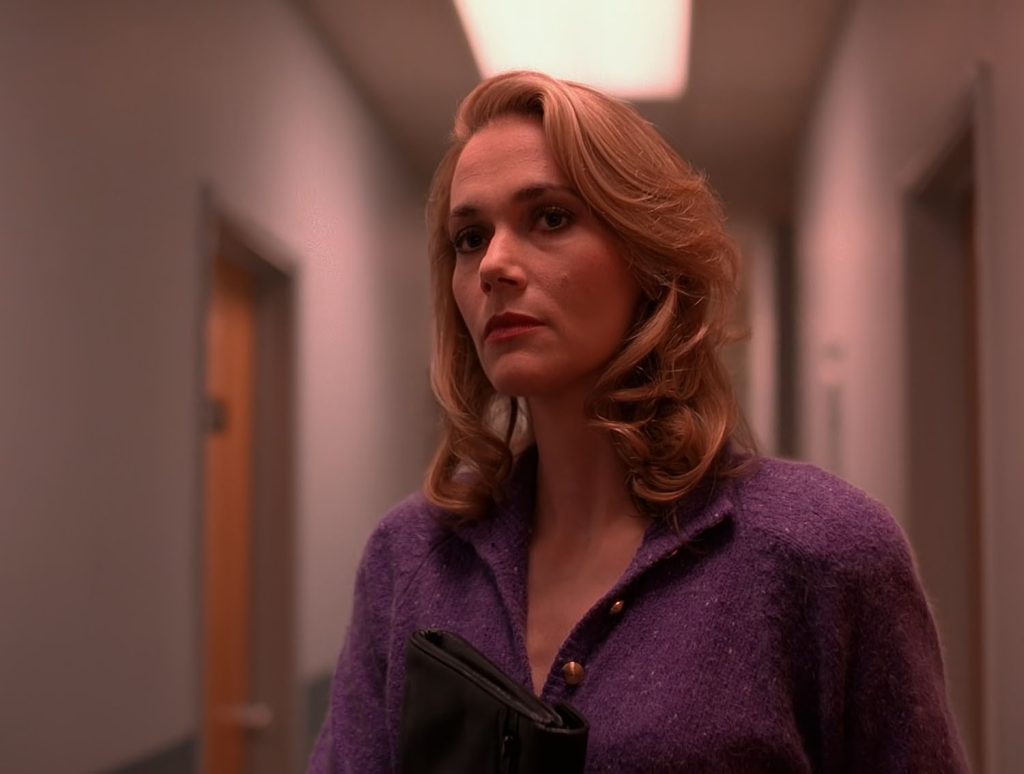
The interview concludes with a brief discussion about the show’s pacing.
LEMON: But one of the elements that stands out about Twin Peaks is that its languorous rhythms are not the rhythms of today’s television.
LIPTON: Exactly. And I think it’s put a lot of viewers at ease. and yet, what’s so deliberate about it is the way David has used the pace to create this rhythm—to catch you off-guard, so that it seems slower than it is, but there is a definite edge. And it’s not done necessarily with the noise and/or the cutting. No, you’re at this relaxed rhythm. and then there’s the jolt or the quirk. That’s how he’s hooked you.
LEMON: There, a meditative quality to the show. And yet one doesn’t want only to watch a program that’s meditative, just as in life one doesn’t want to meditate all day.
LIPTON: No, no, no.
LEMON: Because you, be bored out of your mind.
LIPTON: [Laughing] Well, maybe into your mind. But I wish there was more of that time while I’m working — that inward time.
LEMON: At least you’re making the time. Not everyone does.
LIPTON: You have to, because it’s just taking responsibility for yourself. I don’t lose myself anymore, like I did 20 years ago—you know, tears and guilt, and -what if,” and all. I was always afraid what I had would go away. But I can be recognized, and I’m not threatened anymore. I can bring people something. I’m not precisely sure what it is yet. Maybe I don’t want to know. But I have an effect.
LEMON: And perhaps something about the unknowable is unknowable for a reason.
LIPTON: I think that may be the best part of all.
EGG MAGAZINE, OCTOBER 1990 – PAGE 104
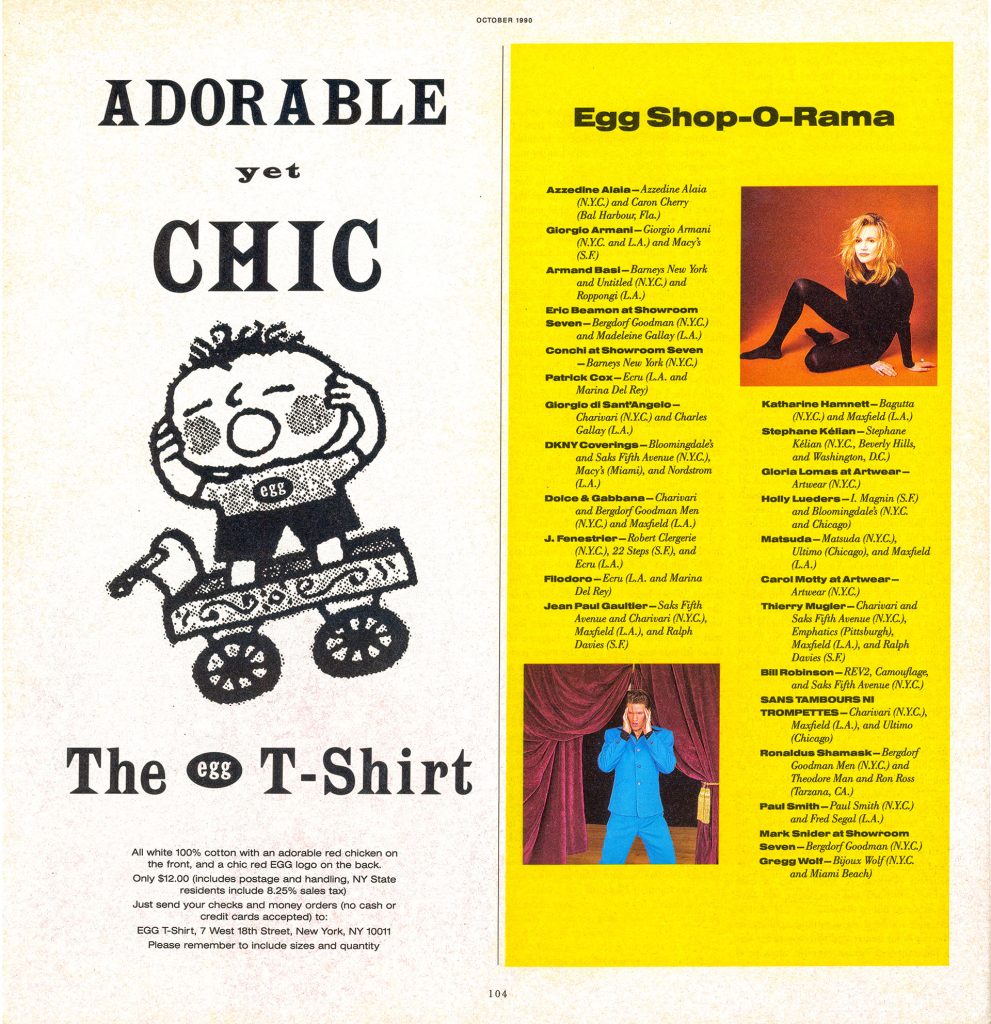
Peggy appears one more time on page 104 in the Egg Shop-O-Rama section. The photo is an alternate take of her Egg magazine cover image by Deborah Feingold.
With Lipton’s passing on May 11, 2019, having her interview preserved on Twin Peaks Blog is even more important now.
Discover more from TWIN PEAKS BLOG
Subscribe to get the latest posts sent to your email.

